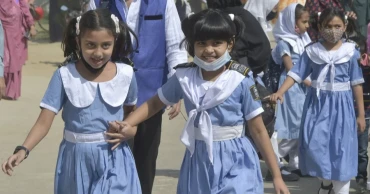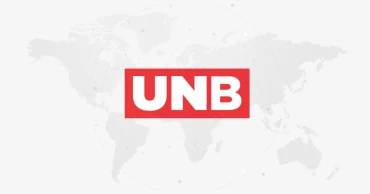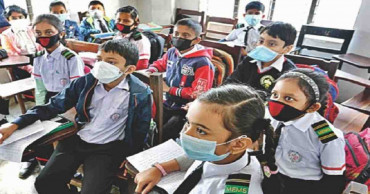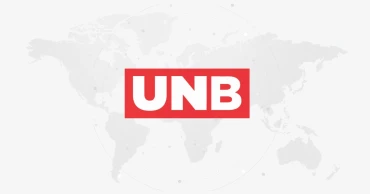primary education
Excellence in Education: Shibram Ideal Public School shines in Lalmonirhat
Lalmonirhat’s Shibram Ideal Public School, located near the Circuit House at the heart of the district, has emerged as a bright example in the region’s education sector.
Established in 2015, the unique institution is modelled on the cadet college system, according to its founder and director, Rashedul Islam Rashed.
One of the school’s primary goals is to prepare its younger students for future admission into cadet colleges.
Read more: Dhaka to get state-of-the-art special needs school
A closer look reveals the school’s distinctive approach: students across all classes exhibit remarkably uniform handwriting, imbued with artistic flair.
This meticulous attention to penmanship has consistently amazed parents and visiting officials alike.
Alongside mother tongue education, the school places strong emphasis on English proficiency and provides tailored instruction in students’ respective religious teachings.
This year, the school has distributed copies of the Holy Quran to all 42 students, further strengthening its commitment to holistic learning.
4th International Symposium on Quality Assurance in Engineering Education concludes
The school has also been recognised at the Rangpur divisional level, securing first place in a handwriting competition. In addition, it has ranked among the top schools in the district in private scholarship examinations.
Shibram Ideal Public School attracts students not only from within Lalmonirhat but also from neighbouring districts. For these students, the school offers a child-friendly residential facility.
Local students attend regular daytime classes but often return in the afternoons or evenings to continue their studies in a stimulating and enjoyable environment.
The school’s residential programme provides distant students with nutritious meals, comfortable accommodation, and attentive guidance in academics and character-building.
Govt set to implement new project to digitise medical, nursing education
2 months ago
Leadership vacuum cripples primary education in Sonargaon
Academic and administrative activities at 63 out of 113 government-run primary schools in Sonargaon upazila of Narayanganj district are severely hampered, as more than half of these institutions have been running for years without permanent head teachers.
The leadership vacuum has led to a major crisis in primary education, deeply concerning parents and local communities about the quality of instruction for the country’s future generations.
Currently, locals said, assistant teachers are forced to operate as acting headmasters, struggling to balance critical administrative duties with their primary responsibility of classroom teaching.
They said this dual role is proving unsustainable and is directly disrupting regular education.
Morsheda Akhter, the acting head of Parameshwardi Government Primary School, shared the heavy burden. “At least 10 days every month I have to remain busy with official work at the upazila office, leaving classes seriously disrupted,” she said.
Echoing this frustration, Muslima Akhter, acting head of Amgaon Bargao Government Primary School, noted she is required to be at the upazila office from the third to the ninth of each month.
Consequently, she cannot conduct regular classes, which significantly harms students’ studies.
Adviser Bidhan Ranjan Roy emphasises urgent need to improve quality of primary education
Shah Alam, acting head of Ladhurchar Government Primary School, corroborated the sentiment, stating that the immense administrative workload leaves him with little time for classroom teaching.
The problem is not new for many schools.
At Tekpara Government Primary School, acting head teacher Saleha Akhter revealed that the school has been without a head teacher for a significant three years.
With a minimal staff of only four teachers, she explained, “it has become very difficult to run the school properly, and students’ learning is suffering.”
Parents are increasingly worried. Rabiul Islam, the father of a fifth grader, lamented that teachers are "Overstretched and one teacher often has to handle multiple classes at the same time. This situation is directly impacting the quality of education provided.”
According to the upazila primary education office, the root of the crisis lies in a centralised administrative bottleneck.
Law enacted to govern National Academy of Primary Education
Sonargaon Upazila Education Officer Shafiqul Islam Sarkar acknowledged the gravity of the situation, saying that the recruitment and promotion of head teachers is a national matter. “Unless promotions are cleared centrally, local vacancies cannot be filled. This has aggravated the crisis,” he added.
Guardians and local community members, expressing grave concern over the situation, have urgently called upon the authorities concerned to fill the vacant posts with qualified teachers soon to ensure smooth education and secure the future of the nation’s students.
4 months ago
Primary schools reopen
Primary schools across Bangladesh have reopened after around one month of closure.
Students were seen going to schools in the capital in the morning (August 14, 2024).
All government primary schools under eight city corporation areas of the country were declared closed for an indefinite period on July 17 amid tension over students’ demonstrations for quota reform.
August 15 public holiday canceled
1 year ago
Guidelines issued for primary schools reopening tomorrow amid heatwave
As the country grapples with an intense heatwave, the government has announced the reopening of primary school academic activities starting Sunday, April 28.
The Primary and Mass Education Ministry, through a notification signed by Senior Information Officer Mahbubur Rahman Tuhin, outlined the operational adjustments to accommodate the sweltering conditions.
School hours will be limited to the cooler morning hours, from 8:00 am to 11:30 am. For schools operating in two shifts, the first shift will run from 8:00 am to 9:30 am and the second from 9:45 am to 11:30 am.
Cuet students’ road safety movement postponed, to resume classes
Despite these changes, pre-primary level classes will remain closed until further notice, and daily school assemblies will be suspended to avoid prolonged exposure to the heat.
The decision follows a similar action taken for secondary level schools and colleges, which are set to reopen on the same day, April 28.
The resumption comes after an extended closure initially planned until April 27 due to the prolonged hot weather following the Eid holidays. Outdoor activities and those requiring sun exposure at these institutions will continue to be limited.
To make up for educational disruptions caused by the heatwave and other interruptions, classes will also be conducted on Saturdays until further notice, according to the ministry's notification.
Secondary schools, colleges to reopen April 28 amid heat wave
The Bangladesh Meteorological Department has forecasted that the current heatwave conditions, which recorded a high of 42.7 degrees Celsius in Chuadanga on Friday, may persist for another 72 hours starting Thursday morning. The government's proactive measures aim to balance educational needs with health and safety concerns during this challenging climate period.
1 year ago
Chevron celebrates 13 years of partnership with Save the Children
Chevron Bangladesh and Save the Children have celebrated their long partnership to promote access and increase basic educational outcomes for marginalized children through SHIKHON program.
An event titled‘ Dissemination Program of SHIKHON Tracer Study and Celebrating 13 Years of Partnership’ was held at the Lakeshore Hotel, Gulshan, Dhaka recently.
Read:Chevron signs deal with Rock Energy to market its lube products in Bangladesh
According to a release of the Chevron, the SHIKHON project, a collaboration between Chevron and Save the Children since 2008, has reached more than 21,000 people and provided access to primary education to more than 4,000 at-risk, out-of-school children.
For the past 13 years, it has been a critical safety net and springboard to success for local children.
Under the project, dropped out and out of school children completed primary education (school readiness to Grade V) through Non-Formal Primary Education (NFPE) schools and transitioned to nearest high schools in Grade VI; and marginalized hard-to-reach children completed a pre-primary component and Grades I through III from Early Primary Education (EPE) centers or one-room schools and be equipped to transition into Bangladesh’s national education system from Grade IV and beyond.
At the event, the findings of the Tracer Study on the SHIKHON program were presented by Shah Shamim Ahmed, Associate Professor, Institute of Education and Research, Dhaka University.
The findings from the Tracer Study on the Chevron supported SHIKHON project revealed that the program resulted in increased access to cost-effective non-formal basic education for hardest to reach children in targeted communities, increased efficiency, and quality of non-formal basic education services using holistic approaches for children to succeed in school and increased collaboration between the formal and non-formal primary sectors to promote sharing and adoption of best practices.
The event was attended by Eric M. Walker, President of Chevron Bangladesh, Shahin Islam, Project Director, SHIKHON, Save the Children; Muhammad Imrul Kabir, Corporate Affairs Director, Chevron Bangladesh; Dr. Md. Abdul Halim, Director, Institute of Education and Research, Dhaka University; and Mr. Shah Shamim Ahmed, Associate Professor, Institute of Education and Research, Dhaka University, among others.
Chevron Bangladesh, the operator of three gas fields in Sylhet region in the country, invests in activities and programs that focus primarily on economic development, education and health care, reaching thousands of people in northeast Bangladesh.
Read: Chevron’s scholarship programme for local students continues
Under Chevron Bangladesh’s Quality Education Support initiative, a scholarship drive for high-achieving underprivileged students was launched in 2001. In 2021, scholarships were awarded to 783students in 23 schools.
It also included the remuneration support for additional teachers in selected schools, an endowment fund, sports equipment, school furniture, sanitation facilities and tube-wells to provide safe drinking water for selected schools, said the Chevron.
3 years ago
Japan to provide US$ 5 million to promote Bangladesh primary education
Bangladesh and Japan on Monday signed an exchange of notes and grant agreement on the “Japanese Grant Aid for the Fourth Primary Education Development Programme (PEDP4).”
Japanese Ambassador to Bangladesh Ito Naoki, Secretary, Economic Relations Division, Ministry of Finance Fatima Yasmin and Chief Representative, JICA Bangladesh office Hayakawa Yuho signed the documents for over JPY 500 million or US$ 5 million.
Ambassador Naoki said Japan has consistently made efforts to promote quality education in Bangladesh since the country’s independence in 1971.
Also read: Dhaka-Beijing political trust continues to deepen: Envoy
“Higher education is important, but for the development of the country, it is essential to extend cooperation at every level of education. Above all, education is the only way for children born into poor families to overcome poverty and empower themselves. Japan will continue its strong involvement in primary education,” he said.
Secretary Fatima Yasmin said Japan's cooperation covers a wide range of fields, from infrastructure to education.
“Education, in particular, is an investment for the future, and Japan has always been willing to cooperate and provide assistance for the future of Bangladesh. We are very grateful to Japan. I would like to ask for Japan's continued cooperation in primary education.”
Also read: Korea to provide $700m in soft loans between 2021-25
PEDP is a national development strategic programme for primary education in Bangladesh. Japan has been supporting PEDP in cooperation with other development partners since 2011 under the Sector Wide Approaches (SWAPs).
4 years ago
Almost 6 million primary, secondary students at risk of learning loss
Around 6 million primary and secondary students are at risk of learning loss due to the extended closure of the educational institutions in the country amid the Covid-19 pandemic, according to a study report revealed Monday.
Since the closure of schools in March 2020, there have been severe disruptions in the education of children, especially those from low-income groups.
The extended closure has led to far-reaching consequences including an increased risk of learning losses, dropouts, and psychological and economic costs, says the survey "Covid-19 Impact on Education Life of Children."
Also read: Schools for over 168mn children globally shut for almost a full year: UNICEF
Some 3.42 million are primary school students and 2.50 million secondary school students are now at risk of learning loss.
Power and Participation Research Center (PPRC) and Brac Institute of Governance and Development (BIGD) jointly conducted the rapid telephonic survey between April 2020 and March 2021 to assess the impact of Covid-19 on poverty. It used samples from 6,099 households with around 4,940 consisting of school-going-age children.
Between June 2020 and March 2021, the out-of-pocket expenditure for education increased 11 times. The crisis has increased the opportunity cost of investing in education. Some 8% of school-going boys and 3% of school-going girls are in some form of income-earning activity.
Read No assignments for secondary school students
Without targeted remedial measures, the situation will lead to reduced learning capacity or risk of dropouts in future, says the study.
The survey also revealed that only around 10% of students had access to or used distance learning opportunities to compensate for school closure; public TV classes were viewed by only around 2%.
Some 51% in primary and 61% secondary students went to coaching or private tuition. However, it was lower in urban compared to rural primarily due to higher costs.
Read UN alarm at education crisis: 258 million kids not in school
Even in pre-pandemic times, a greater proportion of secondary school-going-age children were out of school (21%) than primary (14%). More children were out of school in urban slums than rural areas at both primary and secondary levels.
"A significant portion of school-going children are at risk of learning loss. So, school reopening must be coupled with a set of remedial measures to cover the learning loss and help children to cope up," said BIGD Executive Director Dr Imran Matin.
PPRC Chair Dr Hossain Zillur Rahman focused on three main consequences of school closures – learning loss, education cost burdens, and multidimensional social alienation.
Also read: 60.5 percent people in favour of reopening schools: Survey
He said outside class hours, additional programmes are required as a learning loss recovery strategy to mitigate the loss as part of a post-Covid human capital agenda. "Otherwise, a large part of our population will not only be far removed from education but also become deskilled," he added.
Dr Zillur recommended that existing primary and secondary stipend programmes be used to redress the out-of-pocket education cost burdens.
"Using the established database, the government can quickly provide a cash boost by allocating Tk2,960 crore in the 2021-22 budget," he said.
Read 86,452 primary students get stipend, allowance through Nagad in phase 1
4 years ago
Bangladesh Betar to air lessons for primary students from Aug 12
Bangladesh Betar will start broadcasting lessons ‘Ghore bose shikhi’ for primary school students from August 12 so that students could continue academic activities amid the coronavirus pandemic.
5 years ago
Primary Education: 226 teachers, students, officials infected with coronavirus
A total of 226 teachers, students and officials of different primary schools across the country have so far been infected with the coronavirus.
5 years ago
Primary school’s first term examination suspended
The first term examination of primary schools has been suspended amid coronavirus outbreak.
5 years ago








.jpg)
.jpg)






